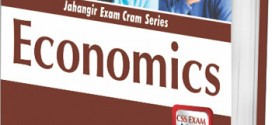The Federal Public Service Commission (FPSC) has modified the syllabus for the CSS exam for CE-2016 and onwards. This change was much needed since various quarters were blaming the structure of civil service recruitment as responsible for declining performance of civil servants. The FPSC has categorized Optional Subjects into seven groups. The subject of Economics now contains 200 marks and …
Read More »Stress Management during CSS Preparation
Stress is nothing but the difference between reality and expectations. As the gap increases, the stress also intensifies. However, stress is not a bad thing at all. Some amount of stress is essential to enhance your performance and to excel in life; it becomes bad only when it starts affecting your performance negatively. A bad stress is also called distress. …
Read More »Broadening the Tax Base, A dire need of the hour
Narrow tax base has often been cited as the most obvious reason for low tax collection in Pakistan. However, the very term “tax base” is largely misinterpreted and is unknown to many people despite the fact that their incomes or activities, annually or periodically, are subject to tax. In Pakistan, Rs 400,000 of non-agricultural income per annum is normally a …
Read More »Terrorism in Pakistan
Eradication Through Equitable Growth Due to its devastating impact on social, economic and political order, terrorism has been the most debated topic, especially since the dawn of the current century. What actions or acts fall under the ambit of terrorism; it is still an unanswered question because no unanimous and universally-accepted definition of terrorism has been developed yet.
Read More »Need for Investment
Investment occupies pivotal position in the economic growth (GDP) of a country as increase in the level of investment boosts economic growth and vice versa. Investment increases the real value of the economy. With increasing level of investment, output of goods and services increases. With additional economic growth, many job opportunities are created and gap between employed and unemployed labour …
Read More »Sources Of Income Inequality
There is no denying the fact that income inequality within as well as across the countries has increased significantly especially after the second wave of globalization. The rich-poor gap, which has widened in the past few decades, speaks volumes about the gravity of the problem of unequal income distribution in the world. It is, therefore, pertinent to analyze the issue …
Read More »ECONOMY AFTER THE GLOBAL FINANCIAL CRISIS
The world economy experienced a severe downturn following the emergence of global financial crisis that started with the burst of housing bubble in the United States in 2007. This bubble was formed due to the monetary policy which enabled the people to borrow at very low cost and it eventually led to excessive lending. Massive increases in subprime mortgages backed …
Read More »Raising Taxes | Policy Options before Tax Reform Commission
At present, the Federal Board of Revenue (FBR) is under immense pressure to raise tax-to-GDP ratio essential for creating fiscal space. To take up all types of tax-related matters including determination of various taxes and duties and finalizing tax ratios, a tax reform commission is in the offing. Given limited fiscal space, narrow tax base and poor tax compliance, presenting …
Read More »LEARNING TO LIVE WITH DEBT
Pakistan’s public debt accumulated to reach 63 per cent of GDP by 2011-12. As a result, the total fiscal requirements to finance budget deficit and to roll over mature debt for 2012-13 reached over 35 per cent of GDP, the highest among the emerging market economies after Egypt (40 per cent) as well as among the advanced economies after Japan …
Read More »Reducing Income Inequality Through Taxation
The word ‘democracy’ a Greek word in origin’ is composed of Demo or the people and ‘Cracy’ rule, or rule of people, it started in city states of Greece. A lame tradition of Democracy was practiced in Rome where it got mixed up with Emperorship and had a zigzag course. Otherwise in Europe, worst authoritarian rule remained entrenched till the …
Read More » Jahangir's World Times First Comprehensive Magazine for students/teachers of competitive exams and general readers as well.
Jahangir's World Times First Comprehensive Magazine for students/teachers of competitive exams and general readers as well.




